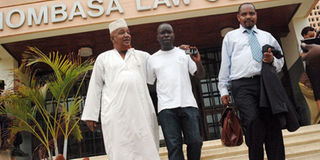Jihad cleric to be paid Sh670,000

Fiery Islamic preacher Sheikh Abubakar Shariff alias 'Makaburi' (left), his lawyer Mr Mbugua Mureithi (left) and Francis Auma from the Muslims for Human Rights (Muhuri) leave Mombasa Law Courts after the High Court awarded him Sh670,000 in damages. Photo|Laban Walloga.
What you need to know:
- Police accuse Sheikh Abubakar of advocating jihad, or holy war, radicalising the youth and recruiting fighters for Al Shabaab, which has been carrying out a campaign of terror against Kenya, killing dozens. Sheikh Abubakar denies the claims but has publicly said Al Shabaab was justified in killing 67 people at Westgate.
- Sheikh Abubakar moved to court through his lawyer, Mr Mureithi Mbugua, challenging the police action. Subsequently, the court directed police to release the items to him.
Muslim preacher Sheikh Abubakar Shariff Abubakar alias Makaburi, whose outspoken support for Al Shabaab and justification of the Westgate attack has earned him notoriety, was Wednesday awarded Sh670,000 in damages for unlawful detention of his property.
Mombasa High Court judge Maureen Odero said the cleric should be paid after his property was seized by police during a raid at his house four years ago. She said that the police failed to persuade the court why they detained electronic equipment, phones and computer accessories they had seized in Sheikh Abubakar’s house.
Police accuse Sheikh Abubakar of advocating jihad, or holy war, radicalising the youth and recruiting fighters for Al Shabaab, which has been carrying out a campaign of terror against Kenya, killing dozens. Sheikh Abubakar denies the claims but has publicly said Al Shabaab was justified in killing 67 people at Westgate.
Wednesday, Lady Justice Odero ruled: “I find that the action of police in retaining the seized items until ordered by the court to produce them contravened the criminal procedure code and was therefore unlawful.
“I, therefore, award to him general damages in the sum of Sh400,000 plus interest at the court rates. I find that the special damages of Sh270,000 claimed by the petitioner as payment to a firm of advocates in respect of the proceeding to compel police to produce in court the items seized from his residence is merited.”
However, the judge dismissed a third prayer in which the cleric had sought a declaration that the search was unlawful and amounted to violation of his rights to privacy and property.
She ruled that a magistrate court acted reasonably when it issued the search warrant to the police whom she also declared were justified to search and seize the items.
She dismissed a fourth prayer in which Sheikh Abubakar sought a declaration that it was unlawful, illegal and unconstitutional for police to seize items not listed in a search warrant.
Police officers from the Anti-Terrorism Unit — acting on reliable intelligence — had searched the cleric’s Sabasaba house alleging that he had stored arms, drugs, explosives and military uniforms.
However, the alleged materials were not found and police instead took electronic equipment which they retained instead of declaring them to the court which had issued them with the search warrant.
Sheikh Abubakar moved to court through his lawyer, Mr Mureithi Mbugua, challenging the police action. Subsequently, the court directed police to release the items to him.
Lady Justice Odero disagreed with chief inspector Abednego Kilonzo who testified before her that the items were retained for forensic analysis at the CID headquarters in Nairobi.
“Section 118 of the criminal procedure code provides that any article seized in pursuance of a search warrant is to be taken before a court having jurisdiction to be dealt with in accordance to law,” she ruled.
She further ruled that a warrant was not a licence for the police to seize property and then keep it in their custody for as long as they wished.





